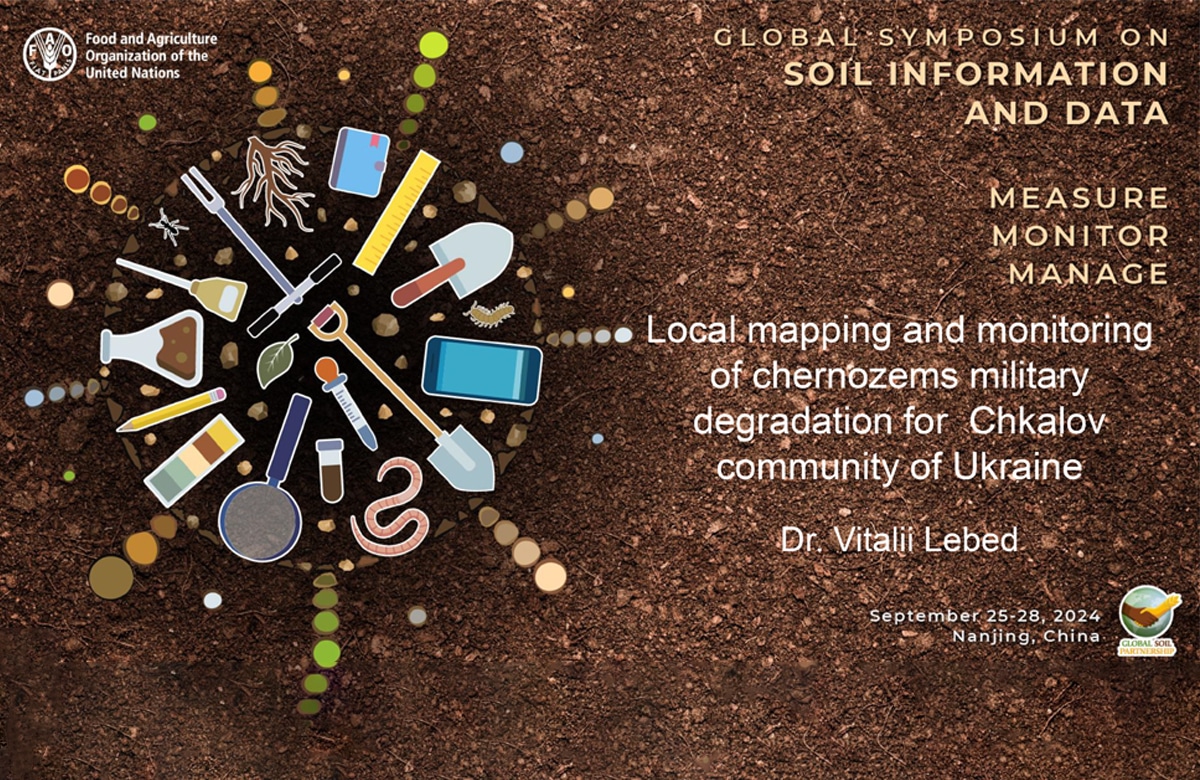The Global Symposium on Soil Information and Data was held in Nanjing, China, on 25-28 September 2024 in a mixed format (GSID’24), it was organised by the Global Soil Partnership (GSP) Food and Agricultural Organization of the United Nations (FAO) and the Institute of Soil Science, Chinese Academy of Sciences (ISSCAS).
Scientific reports were presented on the following main topics:
- Mainstreaming soil data: innovations in analysis, standardization, harmonization and communication;
- Advances in soil mapping and monitoring;
- Soil data for policy and decision-making;
- Soil data as a common good.
Each topic was divided into 8 sub-topics, divided into 6 parallel sessions. On the first and last days of GSID'24 (25 and 27 September), intensive plenary sessions took place. In addition to oral presentations, posters were also presented. On 28 September, a field trip was organised for the full-time participants of the Symposium. The detailed agenda of the Symposium is available on the Global Soil Partnership website https://www.fao.org/global-soil-partnership/gsid24/en/, or on the FAO website https://www.fao.org/fileadmin/user_upload/GSP/GSID24/Agenda.pdf.
The following papers were presented at the Plenary Session on the first day of the Symposium and are posted on the GSP website:
- Integrate legacy data to better predict soil behavior and soil resource management (Ganlin Zhang, Nanjing Institute of Geography and Limnology, Chinese Academy of Sciences, China);
- Next-generation soil carbon systems (Raphael Viscarra Rossel, Curtin University, Australia);
- The third law of geography: a new perspective on digital soil mapping (A-Xing Zhu, University of Wisconsin-Madison, USA );
- FAIR Soil data in support of sustainable land management (Fenny van Egmond, ISRIC World Soil Information, The Netherlands);
- Past, present, and future of proximal sensing of soils: challenges and opportunities (Eyal Ben Dor, Tel Aviv University, Israel);
- From data to decisions: transforming nitrogen management for sustainable food production and environment (Deli Chen, University of Melbourne, Australia);
- Break barriers in soil data stewardship by rewarding data generators (Asim Biswas, University of Guelph, Canada
More than 300 participants took part in the Symposium in Nanjing and more than 2000 registered participants joined the Symposium online as listeners.
The NSC ISSAR was presented with two oral presentations online by PhD in Biological Sciences, Senior Researcher of the Soil Resources Department Vitalii Lebed. The first report: «Creation of the National Soil Information System of Ukraine as a Component of the Global Informatization Process» was presented on 25 September at session 5 on the theme OIL DATA FOR POLICY AND DECISION-MAKING, Sub-theme 3.1: The Role of Soil Data in Achieving and Measuring the Progress on Global Development Agendas.
The second report «Local Mapping and Monitoring of Chernozems Military Degradation for Chkalov Community of Ukraine», prepared by a group of authors from the NSC ISSAR (S. Baliuk, V. Lebed, V. Solovey, Yu. Zalavskyi, M. Solokha, A. Kucher, A. Levin) and PO ‘Society of Researchers of Ukraine’ (P. Ostapenko, O. Bonchkovskyi), presented on 26 September at Session 2 on ‘Advances in soil mapping and monitoring’, subtopic 2.1. ‘Soil Survey and Monitoring Strategies’.
Poster presentation «Monitoring of irrigated soils affected by military actions for management decisions and restoring their fertility» also at Session 2, was presented by Dr. Agricultural Sciences, Leading Researcher of Laboratory of Hydrodeficient, Hydromorphic and Acidic Soils Liudmyla Vorotyntseva.
You can find the presentations on the FAO website dedicated to GSID'24 at: https://www.fao.org/global-soil-partnership/gsid24/en/ .
The main conclusions of the Global Symposium on Soil Information and Data were briefly presented at the closing Plenary Session by the GGP Secretariat representative Yuxin Tong (FAO):
- Global soil information is challenged by poor data quality, which leads to irrelevant decisions;
- The harmonisation of soil data, methods and metadata is highlighted as critical to improving the availability and usability of soil data;
- Spectroscopy and proximal sensing should be used more widely to optimise field data;
- A lot of research is focused on ‘high resolution’ soil mapping;
- Soil organic carbon (SOC) and its spatial and temporal variations are still a hot topic of research;
- Integrating data from multiple sources is useful for improving the performance of digital soil mapping (DSM);
- Machine learning has already become the most commonly used DSM technique;
- Many tools have been developed or are being developed to facilitate the collection, analysis and use of soil data by end users.
The information was prepared by Vitalii Lebed, Senior Researcher of the Soil Resources Department, and Arkadii Levin, Coordinator of the NSC ISSAR International Activities.


